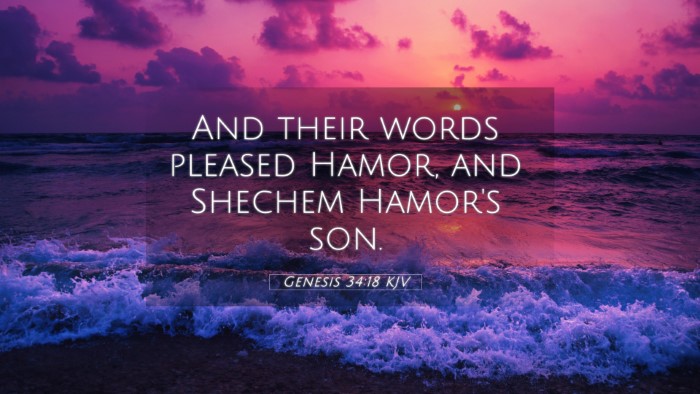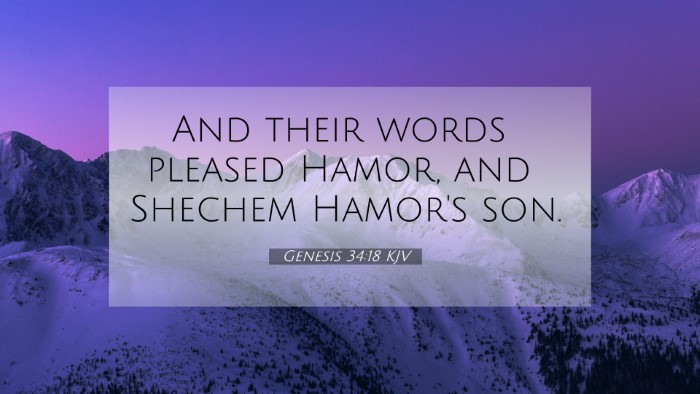Understanding Genesis 34:18
Genesis 34:18 recounts the events surrounding the incident involving Dinah, the daughter of Jacob and Leah, and Shechem, the son of Hamor the Hivite. In this verse, Shechem seeks to formalize his relationship with Dinah after his heinous act against her. This request brings a host of complex themes into focus, reflecting on issues of consent, cultural practices, and the broader implications of family and community relations.
Summary of Genesis 34:18
Verse (Genesis 34:18): "But their words pleased Hamor and Shechem, Hamor's son." In this context, the "words" refer to the negotiations for Dinah’s hand in marriage, following the events that transpired in Shechem's dealings with her.
Thematic Bible Verse Connections
This verse touches on multiple themes within the Biblical narrative:
- Cultural Context: The marriage negotiations highlight the norms of ancient Near Eastern society.
- Family Honor: The incident leads to a complex interplay of family honor and justice.
- Consequences of Actions: Shechem's desire to marry Dinah shows the repercussions of his earlier actions.
Bible Verse Cross-References
This verse is connected to several other Bible passages, providing a deeper understanding of the themes involved:
- Deuteronomy 22:28-29: Discusses the consequences of a man seducing a virgin and the subsequent marriage obligation.
- Exodus 22:16-17: Similar legal stipulations about seduction and marriage.
- Judges 14:1-3: Another case where a young man seeks a marriage outside of the Israelite community.
- 1 Corinthians 7:2: Addresses the importance of marriage and proper conduct in relationships.
- Genesis 34:25-29: Continuation of the narrative surrounding the aftermath of Dinah's situation.
- 2 Samuel 13:14-15: A parallel story involving Amnon and Tamar, which explores themes of desire and violence.
- Jeremiah 5:8: A metaphorical use of unfaithfulness reflecting on betrayal in relationships.
Comparative Bible Verse Analysis
When analyzing Genesis 34:18, several themes can be identified through comparative studies, reflecting on cultural practices and the moral implications of actions:
- Consent and Autonomy: The discussion of marriage without the acceptance of Dinah raises questions about autonomy in biblical contexts.
- Divine Law vs. Human Custom: The juxtaposition of divine principles and cultural practices can be explored through cross-referencing.
- Family Protection: The protective instincts of Dinah's brothers showcase the family dynamics central to this narrative.
Tools for Bible Cross-Referencing
To delve deeper into the meanings and connections in the Bible, various tools and strategies for cross-referencing can be employed:
- Bible Concordance: Helpful for locating verses and understanding the relationships between them.
- Bible Cross-Reference Guide: A structured approach to explore themes and narrative links.
- Bible Chain References: Linking verses thematically to enhance Bible study.
Identifying Connections Between Old and New Testament
This verse, though situated in the Old Testament, relates to various teachings and principles found in the New Testament:
- The view of marriage as a covenant established in Matthew 19:6 reflects the sanctity round familial relationships.
- Lessons on human sin and the necessity of repentance can be cross-referenced with Romans 3:23 and similar verses.
Conclusion
Genesis 34:18 serves as a rich verse for exploration, combining elements of cultural critique, familial ethics, and inter-Biblical dialogue. By employing cross-referencing techniques, readers can gain insights into the interconnected nature of scripture and understand the broader implications of biblical narratives. As seen through the lens of various commentaries, the verse becomes a starting point for deeper theological reflection and moral consideration.


